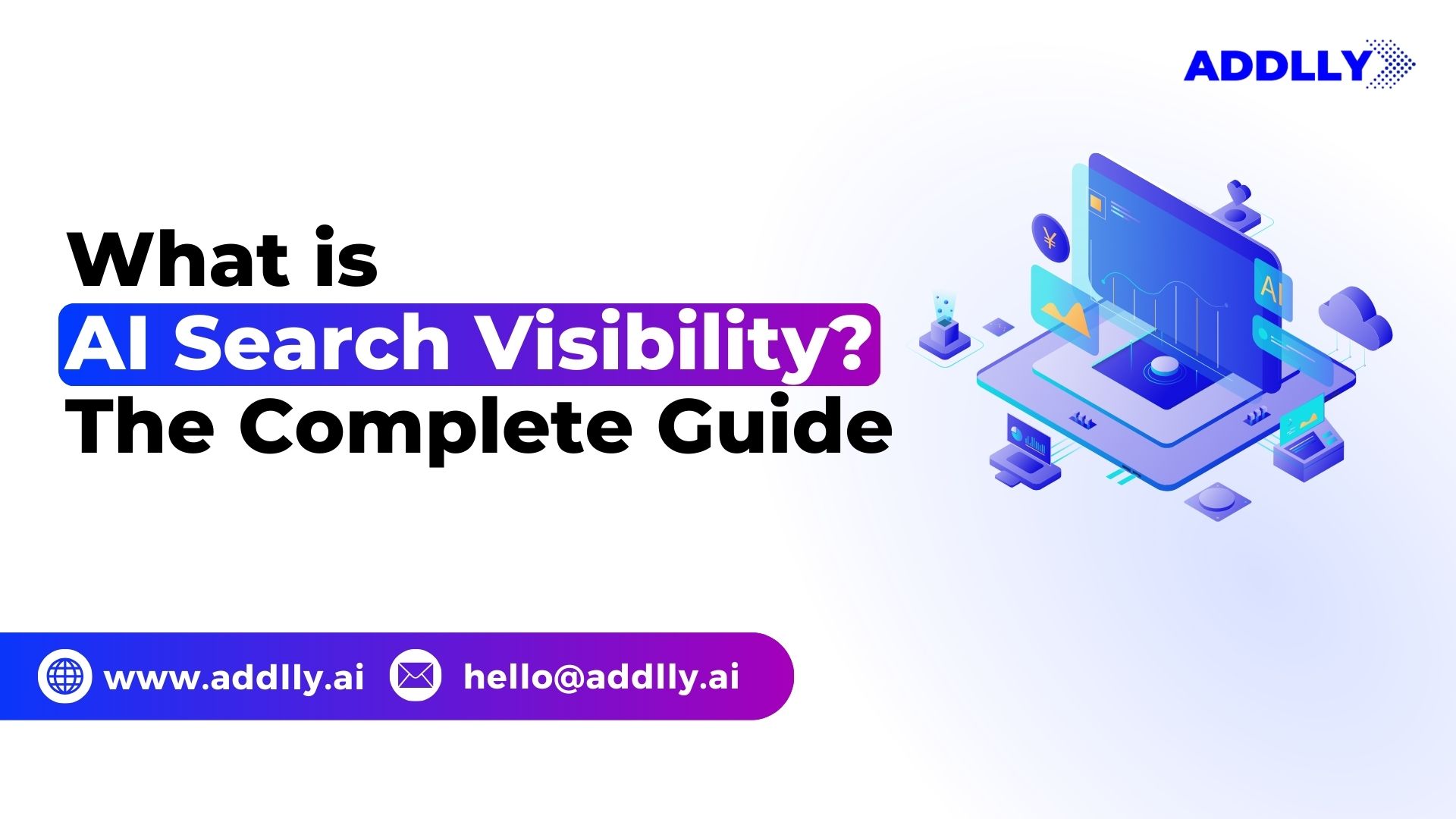AI Search Visibility is the measure of how often and prominently a brand appears in answers generated by AI-powered search platforms such as ChatGPT, Google AI Overviews, and Gemini. Unlike traditional search engines that display ranked lists of results, AI search tools deliver concise, authoritative responses, making visibility in these outputs critical for influencing consumer decisions.
This shift towards generative AI search means brands must adopt new optimisation strategies, including Generative Engine Optimization (GEO), to ensure their content is accurately interpreted and reliably presented by AI systems. Maintaining AI Search Visibility involves expertise in content creation, monitoring AI-driven traffic, and actively shaping how AI platforms reference and represent brand messaging.

How Does AI Search Visibility Differ from Traditional SEO?
AI Search Visibility differs from traditional SEO in its focus on appearing within AI-generated answers rather than ranking in search engine results pages (SERPs). While SEO targets keyword optimisation and backlinks to climb search rankings, AI Search Visibility centres on how content is parsed and synthesised by conversational AI models.
But there is more to it than that – here’s a chart comparing what you should be optiizing depending on whether you are focusing on SEO or AI Search.
AI search platforms aggregate trusted sources to generate a single, authoritative response, often omitting direct website links or ranked lists. GEO (Generative Engine Optimization) is the strategy designed to optimise content specifically for AI parsing, ensuring brands are referenced in relevant answers.
- Traditional SEO aims for higher placement in SERPs via keywords and link building.
- AI Search Visibility prioritises structured, authoritative content that AI can easily interpret and cite.
- GEO supports brands in adapting their content for AI-driven environments, bridging the gap between old and new search paradigms.
Understanding the distinction helps businesses allocate resources effectively, ensuring their messaging reaches consumers whether they search via traditional engines or AI-powered platforms.
Here’s a table comparing the differences between AI search visibility and traditional SEO.
| Traditional Search | AI Search |
| Displays a list of clickable links | Gives direct, conversational answers with source mentions |
| Users click through to visit sites | Many users get what they need without clicking |
| Rankings determined by SEO signals | Selection based on perceived authority and relevance to the question |
| Higher ranking position = more clicks | Quality of mention and context in the answer matter most |
| Keyword targeting and technical SEO drive results | Clear, authoritative, well-structured content drives results |
How Does AI Search Visibility Impact Your Business?
A recent report by Forbes found that AI search engines can drain your website’s organic traffic by up to 64%, varying based on industries.
This shift is a result of AI platforms like ChatGPT, Perplexity, and Google SGE providing direct answers to users’ queries, reducing the need for them to click through to websites. As a result, brands that aren’t strategically optimized for AI search visibility risk losing out on valuable traffic, even if their traditional SEO strategies are strong.
If your brand isn’t appearing in AI-generated responses, you’re essentially invisible to a large portion of the audience relying on AI for their information. This makes it crucial for businesses to adopt strategies that ensure they’re visible in AI answers, not just traditional search results.
How Can You Improve AI Search Visibility?
The key strategies for improving AI Search Visibility include Generative Engine Optimization (GEO), Answer Engine Optimization (AEO), authoritative content creation, and proactive management of brand messaging. GEO involves structuring content for easy parsing by AI bots such as ChatGPT-user and PerplexityBot, ensuring accuracy and consistency.
But SEO on its own takes a lot to operate. Between developing a mobile-friendly website, writing SEO-friendly content, and acquiring backlinks, not all companies have the resources to go big on GEO. By leveraging GEO tools like Addlly AI, brands can now balance out their optimization efforts for both SEO and GEO without reaching deeper into their budget.
Improve Data Quality and Structured Content
High content quality, presented in a well-structured format, is fundamental to success in AI search visibility. AI models favor information that is reliable, credible, properly formatted, and supported by clear schema markup.
This means that your digital assets need to be accurate, regularly updated, and presented in a way that is easy for AI agents to interpret.
Structured data, such as tables, bullet points, takeaway snippets, and semantic HTML, allows AI systems to quickly recognise and elevate authoritative material.
Recent studies indicate that brands implementing robust schema and structured content experience up to a 35% increase in citation rates by AI engines.
This reinforces the value of investing in data quality not only for traditional SEO but as a critical factor for visibility in AI-powered search environments.
For enterprises, prioritising structured content helps bridge the gap between legacy optimisation techniques and the demands of modern AI discovery.
Enforce Brand Consistency Across Channels
Maintaining a unified brand voice across websites, social media, and third-party platforms is essential for recognition by AI agents. Inconsistent messaging can lead to confusion, causing AI models to dilute or misrepresent a brand’s expertise within answer engines.
This consistency also translates to credibility, meaning that the more ‘aligned’ your brand voice is across different channels, the more unified – and therefore trustworthy – your brand is in the eyes of AI answer engines.
Granted, each AI search platform has its own AI citation patterns. This means that just because ChatGPT cited your content, doesn’t mean that Perplexity will do the same. That’s why having a multi-platform AI search visibility tool like Addlly is important.
Technical Optimization for AI Indexing
Technical elements such as API accessibility, up-to-date sitemaps, and AI-friendly metadata play a significant role in how content is indexed and surfaced by AI platforms.
Your brand should move beyond traditional SEO practices, focusing on enhancements that specifically support AI discovery. This includes ensuring that content is easily retrievable, well-tagged, and compatible with the requirements of leading AI engines.
How Addlly’s GEO AI Agent Suite Help with AI Search Visibility
Addlly’s GEO AI Agent tools offer custom AI agents trained on a brand’s existing content, automating on-brand material generation without prompt engineering expertise. This approach ensures messaging is consistent and optimised for both traditional search engines and AI platforms.
- GEO techniques enhance content discoverability and interpretation by AI engines.
- Custom AI agents automate content creation, maintaining brand consistency across platforms.
- Monitoring AI search performance identifies gaps and opportunities for improvement.
Deploying these strategies allows brands to remain visible and trusted as search behaviour evolves toward AI-driven answers, directly supporting business outcomes.
How Can You Track and Benchmark AI Search Visibility?
Brands can track and benchmark AI Search Visibility using a specialized GEO Audit Tool that monitors how often and in what context their content appears in AI-generated responses.
Addlly AI’s suite of custom AI agents includes GEO functions, enabling enterprises to measure visibility across both traditional and AI search platforms. These tools provide actionable insights into content performance, enabling continuous improvement and adaptation.
- Analytics platforms track brand mentions and prominence in AI search outputs.
- Addlly AI agents benchmark performance and recommend optimisation actions.
- Regular monitoring ensures messaging remains current and authoritative.
Effective tracking and benchmarking empower brands to shape AI-driven narratives, maintaining relevance and trust in a rapidly changing digital landscape.
- AI Search Visibility determines how often a brand appears in AI-generated search responses.
- Generative Engine Optimization (GEO) is essential for structuring content for AI parsing and citation.
- Addlly AI offers enterprise-grade custom agents to automate content creation and visibility monitoring across AI and traditional search platforms.

Frequently Asked Questions about AI Search Visibility
How is AI Search Visibility different from regular SEO rankings?
AI Search Visibility focuses on how often a brand is mentioned or cited in AI-generated answers, while traditional SEO is about ranking higher in lists on search engine results pages.
What specific steps can brands take to improve their AI Search Visibility?
Brands should adopt Generative Engine Optimization (GEO), create authoritative and structured content, and monitor how AI platforms reference their messaging.
Why is being visible in AI search platforms like ChatGPT and Google Gemini important for my brand?
Visibility in AI-generated answers directly influences consumer trust and decisions, as these platforms provide concise, authoritative information rather than just links.
How does Addlly AI help brands optimise for AI Search Visibility?
Addlly AI offers custom AI agents and GEO tools that automate on-brand content creation and monitor visibility across both traditional and AI search platforms.
Can I track how often my brand appears in AI search results?
Yes, analytics platforms and tools like Addlly AI allow you to monitor and benchmark your brand’s presence and performance in AI-generated responses.
What is Generative Engine Optimization (GEO) and why is it essential?
GEO is a strategy to structure and optimise content for AI engines to easily interpret and cite your brand, ensuring higher visibility in conversational search platforms.
How do custom AI agents improve consistency in brand messaging across search platforms?
Custom AI agents automate the creation and optimisation of content, ensuring your brand voice remains consistent whether users search via traditional engines or AI platforms.

